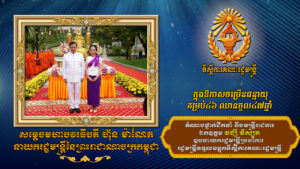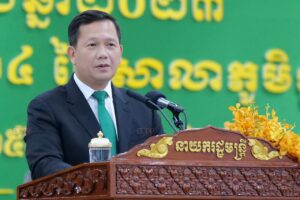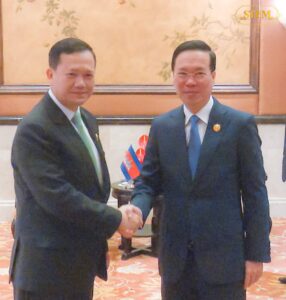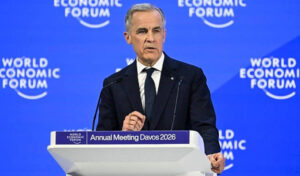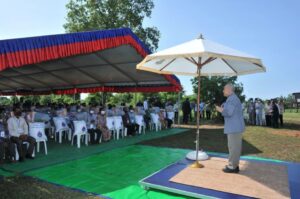(Video) Selected Comments of Samdech Thipadei Hun Manet, at the official opening of Kampot International Tourism Port [Unofficial Translations]
[1]
(1) Before or after Khmer New Year, achievements symbolize continued development
We can consider today’s event as the first public achievement or national achievement that I inaugurated after the Khmer New Year […] Whether before or after the Khmer New Year, these achievements are to serve the interests of the people, help improve the living conditions of the people, and promote the economy in various sectors, whether in Kampong Cham or Tbong Khmum provinces or in Kampot, Preah Sihanouk Province. It is a symbol of continued development […] This year, during the celebration of the Khmer New Year, it is noted that traffic accidents had been nearly 40 percent less compared to last year. This has shown that our people have grown to be more responsible […] Overall, we have successfully united, loved, respected each other, and celebrated the New Year together […]
(2) Connectivity attracts people, provide potential and opportunities
It has created a sense of patriotism through unity, respect, and love to promote our traditional culture, where, in celebrating the Khmer New Year, in the morning we are going to the Buddhist monasteries, and in the evening, we have fun […] We should work together to build on what is positive, to think of positive things, and take positive actions, while promoting the Cambodian culture and traditions through tens of millions of Cambodian people […] In a little while, this Kampot International Tourism Port (KITP) will connect with neighboring countries such as Vietnam, Thailand, etc., which will have more tourists coming […] Connecting infrastructure to attract people, attracting people to provide potential and provide opportunities for people to take advantage, and create opportunities to draw in incomes […]
(3) Raising the Cambodia-China relations to “a community with a shared future for all seasons”
At the same time, our citizens should be proud that Cambodia, a small country, has established an equal right and footing relations with major powers and all countries in the world. Cambodia is one of only three countries on the visiting itinerary (of President Xi Jinping of China) […] Cambodia has not taken a position of favoring or excluding any country. We have relations with all countries in the world. This is a political position based on the principle of respecting independence, sovereignty, and mutual benefit […] The state visit of the Chinese President to Cambodia has confirmed the political message and raised the level of Cambodia-China relations to “a community with a shared future for all seasons,” meaning that in both difficult and easy times, we will continue to work together and cooperate for common development according to the principle of respecting sovereignty, independence, and non-interference in each other’s internal affairs […]
(4) Funan Techo Canal – the truth truly silences groundless attacks
How about the Funan Techo Canal? The opposition spokesperson, always who refuses to understand the truth, says […] “the fact that China announced its assistance to the Canal project is because China has just had a fight with the US. In fact, China has never announced that it would help before”. Analysts and citizens, students, intellectuals, government officials, brothers and sisters, can verify this information in the newspaper sites or in Google […] There was never a time when the Chinese government refused to help the project […]
We launched the construction site of this canal on August 5, 2024. We have been negotiating and resolving the project impacts. We have not stopped […] If we are busy responding to such groundless attacks, Cambodia will not reach its goal. The best way to show the truth is we try to make it happen, when necessary, we explain it from time to time, but we must make the canal happen, to confirm the truth. Only then will the truth truly silence all of them […] We continue to build the Funan Techo Canal and try to complete it according to the plan, to connect the sea and river routes, to make transportation and the economy more integrated […]
(5) No one blocks Cambodia’s right to choose only vegetables or only beef
Regarding the visit of the Chinese president, some say that the US will give Cambodia cabbage […] They say that if you take America, you will have beef. If you take China, you will get cabbage […] Asked if Cambodia chooses beef or vegetables? We choose both. No one has come to oppress us or to block the right to either choose only vegetables or only beef. We choose both because we care about our health. Our health is the economy and the livelihood of Cambodia and/or our people […] The Royal Government of Cambodia has independence and sovereignty in its own decisions, no one can pressure (on our choices) […] In politics, one need to save up political capital. If one loses political capital, s/he loses support […]
(6) The RGC’s position on international affairs adheres to independence, makes friends with all countries, and considers no country an enemy
The political capital of politicians and political groups comes from many factors, of which – virtue and morality, honesty, and a clear stance with people, count […] Honesty is the truth, an honest process. The fact that he (the opposition spokesperson) misinterpreted (the content of) the joint statement that the government has handed over the entire country to China for management, is that you are straying from the truth. The evidence is visible to millions of citizens […] The position of the Royal Government of Cambodia, led by the Cambodian People’s Party, on international affairs for the past 40 years has not changed. We adhere to independence, make friends with all countries, and do not consider any country an enemy […]
(7) Countries do not lose sovereignty and independence for Chinese investments
I would like to confirm that the Chinese investment is not limited to Cambodia. I had asked for the data research last night. In 2023, Chinese investment in the United States was US$ 28 billion […] They bought and sold each other’s companies. The United States bought shares in Chinese companies, and the Chinese companies bought back […] For Japan, in 2023, China invested nearly US$ 2 billion, South Korea US$ 9 billion, more than US$ 5 billion in Australia, and in the ten ASEAN countries, China invested US$ 25 billion. In 2023 […] the size of Chinese investment among ASEAN countries […] was US$ 13 billion in Singapore, US$ 4.5 billion in Indonesia, US$ 2.5 billion in Vietnam, US$ 2.2 billion in Malaysia, US$ 1 billion in Thailand, US$ 900 million in the Philippines, and $400 million in Myanma. China invested only US$ 300 million in Cambodia […] They may ask if those countries lose their sovereignty and independence for the Chinese investment? They do not. The same is true for Cambodia. Each country has a duty to its own country and people […]
(8) Cambodia welcomes everyone at the Ream naval base
On April 5, I inaugurated the modernized naval infrastructure at the Ream Naval base, which was financed by China. On April 12, I inaugurated 71 roads and bridges, which were financed by China. On the 17th and 18th, the Chinese President Xi Jinping visited and presided over the signing ceremony of 37 agreements. On April 19, the Japanese navy ships docked (at the Ream naval base) […] and there have been applications from Vietnam, India, and Russia to do the same. The US is also thinking of coming. We welcome everyone […]
Tomorrow, I will inaugurate the new Ford production line (and Ford sub-assembly plant in Krakor District, Pursat Province), which is an American investment. On April 23rd and 24th, the Thai Prime Minister will visit Cambodia. At the end of May, I will go to the ASEAN Summit and will meet with the leaders of those countries, plus an official visit to Japan. In the middle of the year, I will go to a meeting in Europe to meet with more European leaders. In July, we will inaugurate the Phnom Penh International Airport/TIA, which was financed by the private sector, with participation from British, American, Singaporean, and French companies […]
(9) Blaming central Cambodians abandoning cultural traditions is disrespecting 17 million Cambodian people
Some have blamed the government for “not promoting (national identity)” (during the Khmer New Year,) while millions of people have engaged in the Cambodian folk games and gone go to the Buddhist monasteries […] They posted a picture in which the people in Kampuchea Krom performed traditional dances on stage, the people of Khmer Leu (Upper part of Cambodia) performed traditional parades, while the people of the central Cambodia sprayed water (during the Khmer New Year – for which they blamed it was not Cambodian tradition) […] If everyone and everywhere in Cambodia people abandoned its cultural traditions, I would see a reason why they cursed and criticized us.
However, if they only use one or two negative pictures to blame that the Khmer Kandal (in central Cambodia,) people no longer respect cultural traditions, I believe they are disrespecting the 17 million Cambodian people in the country who maintain their cultural traditions steadfastly. It has been a job for us all – upper-part and lower-part Cambodians, and those of us in the middle part – to keep up our cultural traditions […] We have worked to register the Khmer martial arts and Kun L’bokator and are preparing to register the Sangkanta of Cambodia too (as world heritages) […] This week, we received 20 more art objects from Thailand […] Are these not efforts to preserve our ancestral culture? This is what we strive for together, and whoever does it, the Khmer Kandal people, the 17 million here […]
(10) Choosing CEOs who knows business to efficiently run KTIP
I am calling on civil servants, armed forces, all sectors, to work together to serve the people, both at the national and sub-national levels, and help navigate our ship forward (at this time that we are facing with) the storm of geopolitical, security, and economic instability […] Let us steer the Cambodian ship to the international and regional stage and attract additional investment benefits to the people […] We inaugurated this (KITP) project with certainty and partnership […] We allow Public-private partnerships (PPP) management and operation, but this property belongs to and stays as the state’s […] This project is a bridge and a gateway to harness economic power, nurture it, and increase the potential of Kampot and Kep provinces […]
Whatever the formula, as long as this project runs, is well managed, and maintained, and has good services, it will attract people – it is a good thing. The people of Kampot are the ones who benefit here […] To make KITP run as efficient as the private sector, you should hire the private sector people who know business to do business. There is no need for the state to create a company to do business and manage it […] The state-owned companies/public enterprises are companies that are responsible for state money, the national budget of millions of dollars. So, you have to guarantee efficiency for me. When choosing CEOs, there must be no power grabs or power struggles. It’s all about efficiency […]
(11) Will not let the people blame for working inefficiently and not getting results
There is no perfect option, but the national interest must be ensured to the maximum […] The formula for managing this KITM is to let the private sector apply the O&M module […] with 20-year rights, […] If this formula works, we will study it and replicate it to other places. We did that in the railway sector. The state manages the old track, and the Australia’s Toll Holdings operates […] Before the Khmer New Year, I helped two ministries (to sort out their jobs) […] In terms of roles and responsibilities, they are somewhat intertwined, but they are not inseparable […] I called the two ministers to give me the briefing. Now, which ministry has the highest level of interaction in this matter?
When operating, they must cooperate and divide (their jobs and responsibilities). There have been meetings held for almost a year but they could not get to a decision. I operated for about two hours […] I don’t have time to sit and wait. I wanted results. If we are too busy discussing and not finishing the bureaucratic process, we will not be able to do anything, and we will not be able to compete […] If anyone says that the Prime Minister is interfering, let me tell them that it is up to me whether I interfere or not, as long as I get the results […] I am willing to let the officials blame me for interfering, but I will not let the people blame me for working inefficiently and not getting results […]./.

